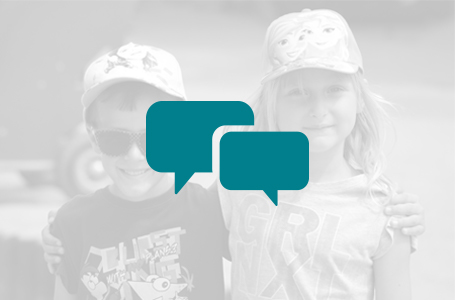
By Terri Shermett, M. Ed., CEO of the Ann Storck Center
Child development describes the changes children experience as they grow older. As children grow physically, they also develop in their knowledge, skills, and behavior.
Parents and other adults, such as aunts, uncles, grandparents, and childcare workers, play important roles in children’s development. As a parent, you are the most important teacher in your child’s life. You certainly know your child best. Learning how children grow, develop and mature is one way to build on what you already know and get innovative ideas about how to support your child’s learning and well-being.
We should always think about the “whole” child. For example, once children learn to use words, it is much easier for them to express their emotions. And once they begin to crawl and/or walk, they begin to discover and learn about the world around them.
Children develop at their own pace, so you never know when your child will develop a new skill. Developmental milestones are skills that children obtain at a particular age. Developmental milestones give you an idea of the changes you can expect as your child gets older. It is helpful to be familiar with them but always keep in mind that small deviations are expected since everyone grows and develops at different rates.
Healthy Development
The early years of a child’s life are vital for his or her health and development. Healthy development means that children of all abilities, including those with special health care needs, can grow up where their social, emotional, and educational needs are met. Having a safe and loving home and spending time with family–playing, singing, reading, and talking–are especially important. Proper nutrition, exercise, and sleep also can make a significant difference.
Effective Parenting Practices
Parenting takes countless different forms. However, specific positive parenting practices work well across diverse families and in diverse settings when providing the care that children need to be happy and healthy and to grow and develop well. Parenting practices that caregivers can support their child’s healthy development:
• Responding to children in a predictable way
• Showing warmth and sensitivity
• Having established routines and household rules (ex. bedtime routines)
• Sharing books and talking with children
• Supporting health and safety
• Using appropriate discipline without harshness
Parents who use these practices can help their child stay healthy, be safe, and be successful in these critical areas—emotional, behavioral, cognitive, and social.
Services for Children with Developmental Disabilities
Research shows that early intervention treatment services can improve a child’s development.
• Early intervention services help children from birth through 3 years of age (36 months) learn important skills.
• For children aged three and older with an identified developmental delay or disability, special education services may be needed.
Services can include a variety of options, depending on the child’s need, such as therapy to help the child talk, move and walk, learn, and interact with others.
FDLRS Child Find, in coordination with the school districts, locates children who are potentially eligible for services under the Individuals with Disabilities Education Act (IDEA) and links them with needed services.
Child Find services help promote public awareness of programs and services available for young children who either have a disability, impairment or are at risk of developing disabilities. Service coordination for diagnostic screening, placement, training, and support is provided.
Child Find programs are offered by each state to evaluate and identify children who need special education services and supports including therapies. Early intervention programs can provide services from birth to 3 years of age. Local public-school systems can provide the needed services and support for children aged 3 years and older. Children can access services even if they do not attend public school.
The Individuals with Disabilities Education Act (IDEA) says that children with a diagnosed disability should get special education services. IDEA says that children younger than 3 years of age who are at risk of having developmental delays might be eligible for early intervention treatment services even if the child has not received a formal diagnosis. Treatment for symptoms, such as speech therapy for language delays, may not require a formal diagnosis.
Although early intervention is extremely important, intervention at any age can be helpful. It is best to get an evaluation early so that needed interventions can get started. When parents are concerned about a child’s development, it can be challenging for them to determine the right steps to take.
Ann Storck Center’s Developmental Education and Therapy Center serves infants, toddlers, and school aged children who exhibit developmental delays in one or more of domains: cognitive, social, adaptive, behavior and communication skills. We recognize the importance of collaboration and working hand in hand with certified trained educators, licensed therapists, and caregivers. Together young children can grow and develop in warm, safe nurturing environments
